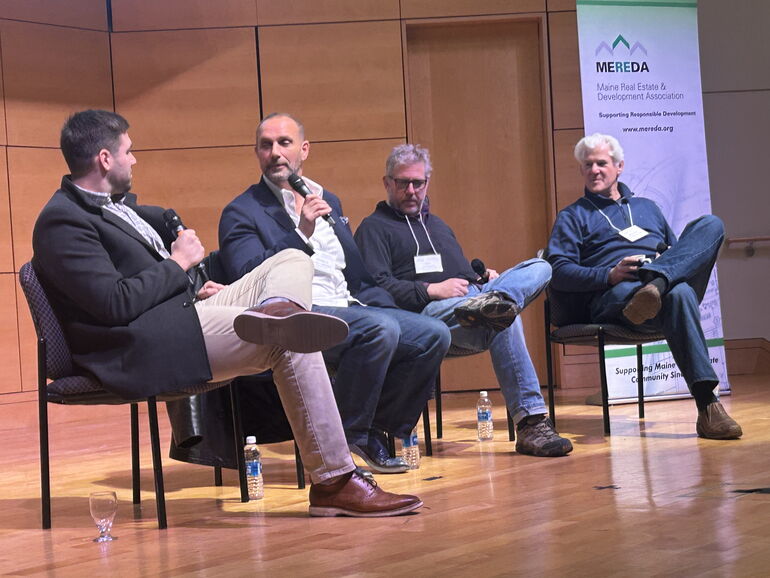Processing Your Payment
Please do not leave this page until complete. This can take a few moments.
- News
-
Editions
-
- Lists
-
Viewpoints
-
Our Events
-
Event Info
- Women's Leadership Forum 2025
- On the Road with Mainebiz in Bethel
- Health Care Forum 2025
- On The Road with Mainebiz in Greenville
- On The Road with Mainebiz in Waterville
- Small Business Forum 2025
- Outstanding Women in Business Reception 2025
- On The Road with Mainebiz in Bath
- 60 Ideas in 60 Minutes Portland 2025
- 40 Under 40 Awards Reception 2025
- On The Road with Mainebiz in Lewiston / Auburn
- 60 Ideas in 60 Minutes Bangor 2025
Award Honorees
- 2025 Business Leaders of the Year
- 2024 Women to Watch Honorees
- 2024 Business Leaders of the Year
- 2023 NextUp: 40 Under 40 Honorees
- 2023 Women to Watch Honorees
- 2023 Business Leaders of the Year
- 2022 NextUp: 40 Under 40 Honorees
- 2022 Women to Watch Honorees
- 2022 Business Leaders of the Year
-
-
Calendar
-
Biz Marketplace
- News
- Editions
- Lists
- Viewpoints
-
Our Events
Event Info
- View all Events
- Women's Leadership Forum 2025
- On the Road with Mainebiz in Bethel
- Health Care Forum 2025
- On The Road with Mainebiz in Greenville
- On The Road with Mainebiz in Waterville
- + More
Award Honorees
- 2025 Business Leaders of the Year
- 2024 Women to Watch Honorees
- 2024 Business Leaders of the Year
- 2023 NextUp: 40 Under 40 Honorees
- 2023 Women to Watch Honorees
- 2023 Business Leaders of the Year
- + More
- 2022 NextUp: 40 Under 40 Honorees
- 2022 Women to Watch Honorees
- 2022 Business Leaders of the Year
- Nomination Forms
- Calendar
- Biz Marketplace
Rising labor costs, rents blamed for Portland's 'restaurant apocalypse'
 Photo / Renee Cordes
From left, moderator Josh Soley with restaurateurs Josh Miranda, Jay Villani and Richard Pfeffer at a MEREDA panel discussion on Portland's 'restaurant apocalypse."
Photo / Renee Cordes
From left, moderator Josh Soley with restaurateurs Josh Miranda, Jay Villani and Richard Pfeffer at a MEREDA panel discussion on Portland's 'restaurant apocalypse."
Higher food and labor costs, lower margins and fewer people dining out — and drinking — are all weighing on restaurants in greater Portland, three business owners said during a panel discussion on the city's “restaurant apocalypse.”
“I’m on the apocalypse side,” said Jay Villani, the chef-owner of Local 188 and Salvage BBQ, two former Congress Street mainstays that he recently closed. They’re among 20 area restaurants that have shut down in the past six months, sparking concerns over Portland’s status as a dining destination six years after Bon Appetit magazine declared it 2018’s “Restaurant City of the Year.”
Wednesday’s event, hosted by the Maine Real Estate & Development Association, sought to shed light on various ugly truths behind running a restaurant during and after the pandemic — along with some of the hurdles for today’s newcomers.
Villani was joined on the panel by Richard Pfeffer, co-owner of Gritty McDuff’s Brew Pub, which has locations in Portland and Auburn but recently closed its Freeport spot after 30 years in business; and Josh Miranda, owner and founder of a group that operates Blyth & Burrows, Via Vecchia, Papi and Henry’s Public House.
Wednesday's event at the University of Southern Maine's Portland campus attracted more than 100 attendees, including current and former restaurant owners.
“The restaurant industry in Maine has completely boomed over the years,” said moderator Josh Soley, president of CORE, a Portland-based commercial real estate firm. “But no one has ever come together to say why or how can we help the industry?”
Panelists talked candidly about recent challenges they have had to overcome.
Pfeffer, for example, said he pulled the plug on Gritty’s in Freeport because of a “real estate problem that we couldn’t get around," while Miranda said he went through "seven months of red-tape hell with City Hall" before he could open the Blyth & Burrows cocktail bar.
Portland 'saturated'
Addressing the costs of running a restaurant, panelists noted that many people can’t afford to dine out anymore. It was noted that increased rent and housing prices are cutting into people's entertainment budgets.
“Portland is saturated in restaurants and bars and $20 doesn't get you much anymore,” said Villani. “People can't go out anymore because of the higher cost of rent and housing. People going out in Portland go to places they know and are familiar with. People are also limiting going out because more money is going to rent.”
Add to that higher labor, rent, utility and food costs for restaurant owners, and it’s not always easy to keep a restaurant business going.
"There’s a point where you have to turn the faucet off,” said Villani.
Pfeffer put some of the blame for the industry's troubles on the government response to the pandemic, with steps like the Paycheck Protection Program, a federal COVID-relief loan program to help small businesses meet payroll and stay afloat.
“We got a pile of PPP money, and we’ve run through it,” Pfeffer said, “but the PPP money was a false economy and anybody who thinks it’s anything else is blind … The reason that restaurants are having a hard time is basically because of politics.”
Villani’s advice to anyone thinking about starting a restaurant today is to know your landlord and vendors before signing any agreements.
“Vet, vet, vet and make sure it’s the right decision for you” and know how many resources you will need to keep you going, he cautioned. "A lot of people go into these things foolishly, blindly.”
2025 outlook
When asked about what 2025 will look like, there were mixed reviews amongst the group. Some said there would be more closures and others expect more new restaurants in the new year.
Soley said he expects to see more closures as we end the year but hopes to see a surge of new restaurants in 2025.
"I think there will be a lot of closures in 2025," said Miranda. "I think banks are seeing all the closures and will be less likely to give out loans. There is also less money and people coming to invest in these new restaurants."













0 Comments